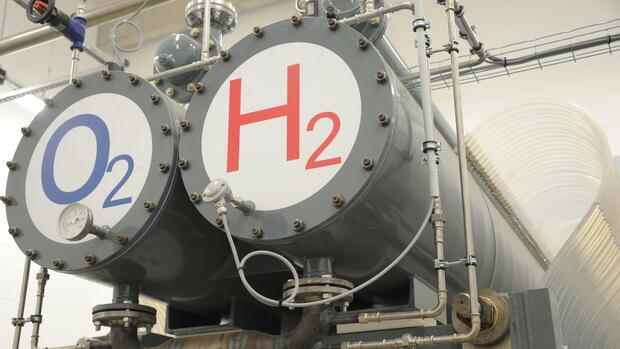In the future, Wintershall wants to produce hydrogen in Wilhelmshaven using Norwegian gas.
(Photo: dpa)
Dusseldorf The raw materials group Wintershall Dea, together with project partners, is investing more than one billion euros in a hydrogen production plant in Wilhelmshaven, as the Handelsblatt learned on Wednesday. The project, called BlueHyNow, is expected to deliver over 200,000 cubic meters of hydrogen per hour and a total of 5.6 terawatt hours (TWh) per year from the end of 2028. This corresponds to about three times the energy consumption of the Volkswagen plant in Wolfsburg in 2019.
Wintershall wants to produce the hydrogen from Norwegian gas, which arrives directly in Wilhelmshaven. The process plants are to run on green wind power from the North Sea. Wintershall wants to feed the generated hydrogen into the pipeline transport network and deliver it to industrial customers. The CO2 that is separated during the production of hydrogen is to be transported by sea to storage facilities in Norway and Denmark, where it will be stored underground.
With the project, Wintershall is participating in the so-called Energyhub Wilhelmshaven. In the northern German coastal town, work is also currently beginning on the construction of the first liquefied natural gas (LNG) terminal. Economics Minister Robert Habeck wants to visit the site on Thursday.
Wintershall is also expanding its business in Algeria. On Wednesday, the company signed a purchase agreement with Italian utility Edison. Wintershall buys Edison’s 11.25 percent stake in the Reggane Nord natural gas project and will thus hold a 30.75 percent stake in the future.
Top jobs of the day
Find the best jobs now and
be notified by email.
With the new investments, Wintershall wants to break away from Russia. To date, the company has been one of Gazprom’s closest partners in the West. In Siberia, both groups produce gas through a joint venture, and Wintershall also produces oil in Russia.
Only eleven percent of Germans see Russia as a reliable natural gas supplier
This business is theoretically valuable given the current high energy prices, but is increasingly becoming a problem in practice. Because of the Russian war of aggression in Ukraine and international sanctions against Russia, more and more Western companies are abandoning their activities in Russia.
Wintershall has so far stuck to its oil and gas fields in Russia – also with the argument that gas is produced there that Russia then exports to Germany. If Wintershall pulled out, the facilities in Siberia would probably go to Russian state companies.
However, shortly after Russia’s attack on Ukraine, Wintershall suspended all plans for new production projects in Russia. Money for investments that the group may have wanted to make in Russia is now available for alternative projects.
It is important for Wintershall to focus on new business fields for image reasons alone. This is shown by a representative survey by the Allensbach Institute on behalf of Wintershall, which was exclusively available to the Handelsblatt on Wednesday. According to this, in February 30 percent of Germans still trusted Russia as a reliable supplier of natural gas – now it is only eleven percent, less than in the Middle East or North Africa. Norway, on the other hand, is now viewed by 85 percent of Germans as a reliable partner.
But the existing business in Russia is also a burden for Wintershall in the long term. Financial market players assume that it is practically worthless. After all, the EU is currently planning a complete import ban on Russian oil. This is not only a problem for Wintershall itself, but also for the parent company, the chemical giant BASF.
BASF holds a good 72 percent majority in Wintershall, the rest is held by the investment company Letter One. Its shareholders include several Russian oligarchs. BASF has long been planning to list its subsidiary Wintershall Dea on the stock exchange. However, in the current market environment and in view of Wintershall’s business in Russia, this is currently considered hopeless.
>> Read also: Balance sheet check: The Russia mortgage of the chemical company BASF
According to industry circles, BASF is now considering spinning off Wintershall’s Russian business and selling it or exchanging it in the course of a so-called asset swap. The co-owner Letter One is a possible buyer.
However, it is questionable whether Letter One has any interest in the Russian business. Mikhail Fridman, oligarch and CEO of Letter One, is already on the EU sanctions lists. Apparently he prefers to distance himself from Moscow and has already spoken out against the war. It is therefore still unclear when an IPO will take place. However, it is also clear that BASF does not want to wait forever before separating from Wintershall.
More: Von der Leyen wants a “complete import ban” on Russian oil

